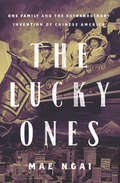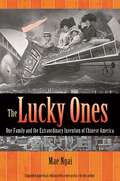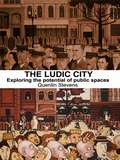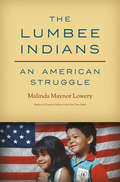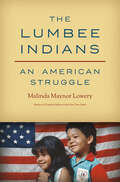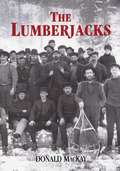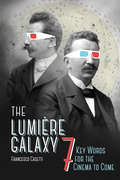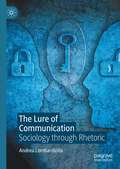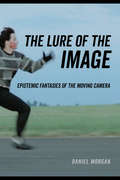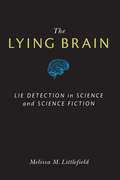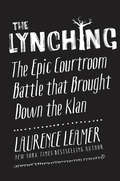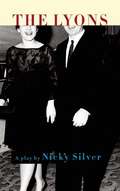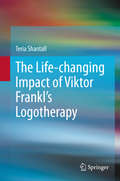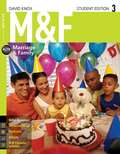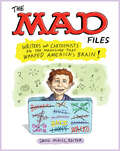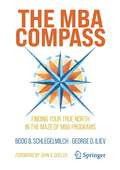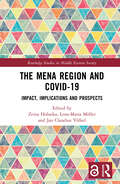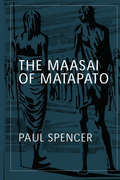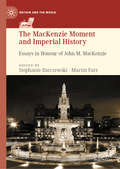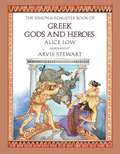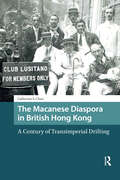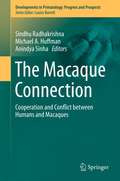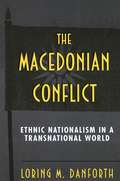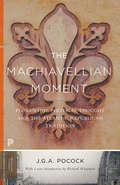- Table View
- List View
The Lucky Ones: One Family and the Extraordinary Invention of Chinese America
by Mae NgaiIf you're Irish American or African American or Eastern European Jewish American, there's a rich literature to give you a sense of your family's arrival-in-America story. Until now, that hasn't been the case for Chinese Americans. From noted historian Mae Ngai, The Lucky Ones uncovers the three-generational saga of the Tape family. It's a sweeping story centered on patriarch Jeu Dip's (Joseph Tape's) self-invention as an immigration broker in post-gold rush, racially explosive San Francisco, and the extraordinary rise it enables. Ngai's portrayal of the Tapes as the first of a brand-new social type--middle-class Chinese Americans, with touring cars, hunting dogs, and society weddings to broadcast it--will astonish. Again and again, Tape family history illuminates American history. Seven-year-old Mamie Tape attempts to integrate California schools, resulting in the landmark 1885 Tape v. Hurley. The family's intimate involvement in the 1904 St. Louis World's Fair reveals how the Chinese American culture brokers essentially invented Chinatown--and so Chinese culture--for American audiences. Finally, Mae Ngai reveals aspects--timely, haunting, and hopeful--of the lasting legacy of the immigrant experience for all Americans.
The Lucky Ones: One Family and the Extraordinary Invention of Chinese America - Expanded paperback Edition
by Mae M. NgaiThe Lucky Ones uncovers the story of the Tape family in post-gold rush, racially explosive San Francisco. Mae Ngai paints a fascinating picture of how the role of immigration broker allowed patriarch Jeu Dip (Joseph Tape) to both protest and profit from discrimination, and of the Tapes as the first of a new social type--middle-class Chinese Americans. Tape family history illuminates American history. Seven-year-old Mamie attempts to integrate California schools, resulting in the landmark 1885 case Tape v. Hurley. The family's intimate involvement in the 1904 St. Louis World's Fair reveals how Chinese American brokers essentially invented Chinatown, and so Chinese culture, for American audiences. Finally, The Lucky Ones reveals aspects--timely, haunting, and hopeful--of the lasting legacy of the immigrant experience for all Americans. This expanded edition features a new preface and a selection of historical documents from the Chinese exclusion era that forms the backdrop to the Tape family's story.
The Ludic City: Exploring the Potential of Public Spaces
by Quentin StevensThis international and illustrated work challenges current writings focussing on the problems of urban public space to present a more nuanced and dialectical conception of urban life. Detailed and extensive international urban case studies show how urban open spaces are used for play, which is defined and discussed using Caillois' four-part definition – competition, chance, simulation and vertigo. Stevens explores and analyzes these case studies according to locations where play has been observed: paths, intersections, thresholds, boundaries and props. Applicable to a wide-range of countries and city forms, The Ludic City is a fascinating and stimulating read for all who are involved or interested in the design of urban spaces.
The Lumbee Indians: An American Struggle
by Malinda Maynor LoweryJamestown, the Lost Colony of Roanoke, and Plymouth Rock are central to America's mythic origin stories. Then, we are told, the main characters--the "friendly" Native Americans who met the settlers--disappeared. But the history of the Lumbee Tribe of North Carolina demands that we tell a different story. As the largest tribe east of the Mississippi and one of the largest in the country, the Lumbees have survived in their original homelands, maintaining a distinct identity as Indians in a biracial South. In this passionately written, sweeping work of history, Malinda Maynor Lowery narrates the Lumbees' extraordinary story as never before. The Lumbees' journey as a people sheds new light on America's defining moments, from the first encounters with Europeans to the present day. How and why did the Lumbees both fight to establish the United States and resist the encroachments of its government? How have they not just survived, but thrived, through Civil War, Jim Crow, the civil rights movement, and the war on drugs, to ultimately establish their own constitutional government in the twenty-first century? Their fight for full federal acknowledgment continues to this day, while the Lumbee people's struggle for justice and self-determination continues to transform our view of the American experience. Readers of this book will never see Native American history the same way.
The Lumbee Indians: An American Struggle
by Malinda Maynor LoweryJamestown, the Lost Colony of Roanoke, and Plymouth Rock are central to America's mythic origin stories. Then, we are told, the main characters--the "friendly" Native Americans who met the settlers--disappeared. But the history of the Lumbee Tribe of North Carolina demands that we tell a different story. As the largest tribe east of the Mississippi and one of the largest in the country, the Lumbees have survived in their original homelands, maintaining a distinct identity as Indians in a biracial South. In this passionately written, sweeping work of history, Malinda Maynor Lowery narrates the Lumbees' extraordinary story as never before. The Lumbees' journey as a people sheds new light on America's defining moments, from the first encounters with Europeans to the present day. How and why did the Lumbees both fight to establish the United States and resist the encroachments of its government? How have they not just survived, but thrived, through Civil War, Jim Crow, the civil rights movement, and the war on drugs, to ultimately establish their own constitutional government in the twenty-first century? Their fight for full federal acknowledgment continues to this day, while the Lumbee people's struggle for justice and self-determination continues to transform our view of the American experience. Readers of this book will never see Native American history the same way.
The Lumberjacks
by Donald MackayShort-listed for the 1978 Governor General’s Award for Non-Fiction The 19th century spawned a unique breed of men who took pride in their woodsmen skills and rough codes of conduct. They called themselves lumberers, shantymen, timber beasts, les bucherons – and, more recently, lumberjacks, working in the vast forests of eastern Canada and British Columbia. Across the country, farm boys would go to the woods, lumbering being the only winter work available. Immigrants – Swedes and Finns more often than not – resumed the trades they had learned so well in the forests of northern Europe. They broke the cold, hard monotony of camp life with songs, tall tales and card games. Within these pages, author Donald MacKay allows us a glimpse into that moment in our heritage when men entered the virgin forest to carve out an industry from the seemingly endless array of pine, spruce, maple and balsam fir found there.
The Lumière Galaxy
by Francesco CasettiFrancesco Casetti believes new media technologies are producing an exciting new era in cinema aesthetics. Whether we experience film in the theater, on our hand-held devices, in galleries and museums, onboard and in flight, or up in the clouds in the bits we download, cinema continues to alter our habits and excite our imaginations.Casetti travels from the remote corners of film history and theory to the most surprising sites on the internet and in our cities to prove the ongoing relevance of cinema. He does away with traditional notions of canon, repetition, apparatus, and spectatorship in favor of new keywords, including expansion, relocation, assemblage, and performance. The result is an innovative understanding of cinema's place in our lives and culture, along with a critical sea-change in the study of the art. The more the nature of cinema transforms, the more it discovers its own identity, and Casetti helps readers realize the galaxy of possibilities embedded in the medium.
The Lumière Galaxy: Seven Key Words for the Cinema to Come (Film and Culture Series)
by Francesco CasettiFrancesco Casetti believes new media technologies are producing an exciting new era in cinema aesthetics. Whether we experience film in the theater, on our hand-held devices, in galleries and museums, onboard and in flight, or up in the clouds in the bits we download, cinema continues to alter our habits and excite our imaginations. Casetti travels from the remote corners of film history and theory to the most surprising sites on the internet and in our cities to prove the ongoing relevance of cinema. He does away with traditional notions of canon, repetition, apparatus, and spectatorship in favor of new keywords, including expansion, relocation, assemblage, and performance. The result is an innovative understanding of cinema's place in our lives and culture, along with a critical sea-change in the study of the art. The more the nature of cinema transforms, the more it discovers its own identity, and Casetti helps readers realize the galaxy of possibilities embedded in the medium.
The Lure of Communication: Sociology through Rhetoric
by Andrea LombardiniloThis book addresses the convergence of sociology, communication and rhetoric, with particular reference to the contemporary expressive and social patterns of mass communication. Using rhetoric as a meta-conceptual apparatus for the sociology of communication, this book offers an original and comprehensive critique of historical social theory alongside 20th century communication researchers. The author demonstrates the symbiotic relationship between the rhetorical structures of the media-sphere and the new narrative formats in which cultural representation merges into social and civil observation. This book will be of interest to academics and students studying sociology, communication and cultural studies.
The Lure of the Image: Epistemic Fantasies of the Moving Camera
by Daniel MorganThe Lure of the Image shows how a close study of camera movement challenges key assumptions underlying a wide range of debates within cinema and media studies. Highlighting the shifting intersection of point of view and camera position, Daniel Morgan draws on a range of theoretical arguments and detailed analyses across cinemas to reimagine the relation between spectator and camera—and between camera and film world. With sustained accounts of how the camera moves in films by Fritz Lang, Guru Dutt, Max Ophuls, and Terrence Malick and in contemporary digital technologies, The Lure of the Image exposes the persistent fantasy that we move with the camera within the world of the film and examines the ways that filmmakers have exploited this fantasy. In so doing, Morgan provides a more flexible account of camera movement, one that enables a fuller understanding of the political and ethical stakes entailed by this key component of cinematic style.
The Lying Brain: Lie Detection and Science Fiction
by Melissa M. Littlefield"The Lying Brain is a study to take seriously. Its argument is timely, clear, and of particular importance to the enlargement of our understanding of the relationships among science studies, literary studies, and technology studies." ---Ronald Schleifer, University of Oklahoma. Real and imagined machines, including mental microscopes, thought translators, and polygraphs, have long promised to detect deception in human beings. Now, via fMRI and EEG, neuroscientists seem to have found what scientists, lawyers, and law enforcement officials have sought for over a century: foolproof lie detection. But are these new lie detection technologies any different from their predecessors? The Lying Brain is the first book to explore the cultural history of an array of lie detection technologies: their ideological assumptions, the scientific and fictional literatures that create and market them, and the literacies required for their interpretation. By examining a rich archive of materials about lie detection--from science to science fiction--The Lying Brain demonstrates the interconnections of science, literature, and popular culture in the development and dissemination of deception detection in the American cultural imagination. As Melissa Littlefield demonstrates, neuroscience is not building a more accurate lie detector; it is simply recycling centuries-old ideologies about deception and its detection.
The Lynching: The Epic Courtroom Battle That Brought Down the Klan
by Laurence LeamerThe New York Times bestselling author of The Kennedy Women chronicles the powerful and spellbinding true story of a brutal race-based killing in 1981 and subsequent trials that undid one of the most pernicious organizations in American history--the Ku Klux Klan.On a Friday night in March 1981 Henry Hays and James Knowles scoured the streets of Mobile in their car, hunting for a black man. The young men were members of Klavern 900 of the United Klans of America. They were seeking to retaliate after a largely black jury could not reach a verdict in a trial involving a black man accused of the murder of a white man. The two Klansmen found nineteen-year-old Michael Donald walking home alone. Hays and Knowles abducted him, beat him, cut his throat, and left his body hanging from a tree branch in a racially mixed residential neighborhood.Arrested, charged, and convicted, Hays was sentenced to death--the first time in more than half a century that the state of Alabama sentenced a white man to death for killing a black man. On behalf of Michael's grieving mother, Morris Dees, the legendary civil rights lawyer and cofounder of the Southern Poverty Law Center, filed a civil suit against the members of the local Klan unit involved and the UKA, the largest Klan organization. Charging them with conspiracy, Dees put the Klan on trial, resulting in a verdict that would level a deadly blow to its organization.Based on numerous interviews and extensive archival research, The Lynching brings to life two dramatic trials, during which the Alabama Klan's motives and philosophy were exposed for the evil they represent. In addition to telling a gripping and consequential story, Laurence Leamer chronicles the KKK and its activities in the second half the twentieth century, and illuminates its lingering effect on race relations in America today.The Lynching includes sixteen pages of black-and-white photographs.
The Lyons
by Nicky Silver"Comedy nirvana . . . satisfyingly mean and funny."-New York Post"Without sacrificing his mordant wit or bleak worldview, this distinctive dramatist shows a new maturity and empathy in."?The New York Times"Nicky Silver's terrific play is filled with moments when you can't stop laughing even though the circumstances indicate you really shouldn't. . . . A wonderful little riff on family dysfunction."?Associated Press"Silver finds plenty of fresh bite, and the sheer savagery of his observation here is breathtaking. Watching it brings the dueling sensations of wicked mirth and squirming discomfort at being trapped in the hell of someone else's family horrors. That these are exaggerations of our own is what gives the play its teeth."-The Hollywood ReporterThis vicious, hilarious black comedy opened on Broadway in April 2012 to rave reviews.Nicky Silver, that "strange progeny of a coupling between Mr. Neil Simon and Edward Albee" (The New York Times), has cornered the market on deliciously savage dysfunctional family comedies. Following an acclaimed run Off-Broadway, this intimate and frightening examination of how we cope with loneliness and disappointment currently delights audiences on Broadway.Rita Lyons is the matriarch of a family facing a major crossroads. Her husband, Ben, is dying and her grown children are struggling. As the family gathers in Ben's hospital room, they discover that they're as terrified of being together as they are of being alone.
The Lıfe-changıng Impact of Vıktor Frankl's Logotherapy
by Teria ShantallThis book provides an in-depth analysis of of the logotherapy of Viktor Frankl and delves into the spiritual depths of an inherent search for meaning in life. Written by a highly experienced and competent logotherapist trained by Frankl himself, this book is excitingly new and unique in that it takes the reader, in the role of a client accompanied by the author in the role of the therapist, through the unfolding phase-by-phase process of logotherapy. Logotherapy is explored as a depth and as a height psychology. From a provoked will to meaning out of the depths of a spiritual unconscious, the author takes the search for meaning to the ultimate heights in the achievement of human greatness. This book brings Frankl’s own profound life’s orientation back to life and, in its reader-friendly style, has the freshness of Frankl’s own way of writing. It is written in a refreshingly simple and straightforward style for easy accessibility to a wide readership. It includes cases studies and exercises for readers and is meant for use in logotherapy courses worldwide. Additionally, it will appeal to laypersons seeking a deeper meaning to their lives, psychology students and mental health professionals alike.
The M&F Solution (Third Edition)
by David KnoxTextbook for a course in marriage, family, and other intimate relationships.
The MAD Files: Writers and Cartoonists on the Magazine that Warped America's Brain!
Celebrate America's zaniest and most subversive magazine in 26 essays and comix from all-star contributors, including Roz Chast, Jonathan Lethem, and Grady Hendrix.Before SNL and the wise-guy sarcasm of Letterman and Colbert, before The Simpsons and online memes, there was . . . MAD.A mainstay of countless American childhoods, MAD magazine exploded onto the scene in the 1950s and gleefully thumbed its nose at all the postwar pieties. MAD became the zaniest, most subversive satire magazine ever to be sold on America&’s newsstands, anticipating the spirit of underground comix and &’zines and influencing humor writing in movies, television, and the internet to this day.Edited by David Mikics, The MAD Files celebrates the magazine&’s impact and the legacy of the Usual Gang of Idiots who transformed puerile punchlines and merciless mockery into an art form. 26 essays and comics present a varied, perceptive, and often very funny account of MAD&’s significance, ranging from the cultural to the aesthetic to the personal.Art Spiegelman reflects on how he &“couldn&’t learn much about America from my refugee immigrant parents—but I learned all about it from MAD&”Roz Chast remembers how the magazine was &“love at first sight. . . . It was one of my first inklings that there were other people out there who found the world as ridiculous as I did.&”David Hajdu and Grady Hendrix zero in on MAD&’s hilarious movie spoofsLiel Leibovitz delves into the Jewishness behind the magazine&’s humorand Rachel Shteir amplifies the often unsung contributions of MAD&’s women artists.Several essays are admiring profiles of the individual creators that made MAD what it was: Mort Drucker, Harvey Kurtzman, Al Jaffee, Antonio Prohias, and Will Elder. For longtime fans and new readers alike, The MAD Files is an indispensable guide to America&’s greatest satire magazine.
The MBA Compass: Finding Your True North in the Maze of MBA Programs
by Bodo B. Schlegelmilch George D. IlievLooking to pursue an MBA? The journey can be daunting, but fear not - this book is here to guide you every step of the way.With so many business schools and programs to choose from, it's important to know what you're looking for. That's where this book comes in. The authors help you understand the differences between full-time, modular, online, and executive MBAs, and provide expert advice on selecting the right program for your unique needs. But that's not all – the book also shows you how to make the most of your MBA experience, helping you to develop knowledge, skills, and personal growth. It explores the benefits of alumni associations and shows you how an MBA can be a game-changer for your career.And here's the best part - you don't need to spend a fortune on a Harvard or Stanford MBA to achieve your goals. The book introduces you to a range of high-quality MBA programs across the globe, from Europe to China, India to Latin America, that offer top-notch alternatives that won't break the bank.Whether you're a senior manager, entrepreneur, or fresh out of college, this book is the ultimate resource for anyone seeking to unlock their full potential with an MBA.
The MENA Region and COVID-19: Impact, Implications and Prospects (Routledge Studies in Middle Eastern Society)
by Zeina HobaikaFocusing on the Middle East and North Africa (MENA) region, which comprises some of the world’s richest countries next to some of the poorest, this book offers excellent insights into the discriminatory consequences of the COVID-19 pandemic. With a geographic focus on the MENA region, the multidisciplinary case studies collected in this edited volume reveal that the coronavirus’s impact patterns are a question of two variables: governance performance and socioeconomic potency. Given the global, unprecedented, complex, and systemic nature of COVID-19 – and its long-term implications for societies, governments, international organisations, citizens and corporations – this volume entails a relevance to regions undergoing similar dynamics. Analyses in the book, therefore, have implications for the comparative study of the pandemic and its impact on societies around the globe. Understanding related dynamics and implications, and making use of lessons learned, are a pathway to deal with future similar crises. Questions covered in the volume are relevant to geopolitics, social implications and the relations between political leaders and citizens as beings embedded in various strategies of communication. The volume will appeal to scholars of international politics, political science, risk or crisis governance, economics and sociology, human rights and security, political communication and public health.
The Maasai of Matapato: A Study of Rituals of Rebellion (Routledge Classic Ethnographies)
by Paul SpencerWhen first published in 1988, this classic study was the first to relate the dynamics of the Maasai age organisation to the tensions within the family. Together, these provide the twin strands of a man's career, opposed ritually and reflecting a fundamental ambivalence in Maasai thought. The analysis is illustrated with extensive case material from the the Matapato, selected for this study as a typical Maasai group.
The MacKenzie Moment and Imperial History: Essays in Honour of John M. MacKenzie (Britain and the World)
by Stephanie Barczewski Martin FarrThis book celebrates the career of the eminent historian of the British Empire John M. MacKenzie, who pioneered the examination of the impact of the Empire on metropolitan culture. It is structured around three areas: the cultural impact of empire, 'Four-Nations' history, and global and transnational perspectives. These essays demonstrate MacKenzie’s influence but also interrogate his legacy for the study of imperial history, not only for Britain and the nations of Britain but also in comparative and transnational context. Written by seventeen historians from around the world, its subjects range from Jumbomania in Victorian Britain to popular imperial fiction, the East India Company, the ironic imperial revivalism of the 1960s, Scotland and Ireland and the empire, to transnational Chartism and Belgian colonialism. The essays are framed by three evaluations of what will be known as 'the MacKenzian moment' in the study of imperialism.
The MacMillan Book of Greek Gods and Heroes
by Arvis Stewart Alice Low Barry R. KatzThe gods and heroes of ancient Greece shake heaven and earth in a collection of over thirty stories that breath new life into the myths of Olympus. Here is the triumphant tale of the Trojan Horse, the tragedy of Oedipus, the downfall of Medusa and more. Witness the grand drama of some of the best known heroes of all time in a fresh rendition of these timeless tales.
The Macanese Diaspora in British Hong Kong: A Century of Transimperial Drifting (Asian History)
by Catherine S. ChanDiaspora transformed the urban terrain of colonial societies, creating polyglot worlds out of neighborhoods, workplaces, recreational clubs, and public spheres. It was within these spaces that communities reimagined and reshaped their public identities vis-à-vis emerging government policies and perceptions from other communities. Through a century of Macanese activities in British Hong Kong, The Macanese Diaspora in British Hong Kong: A Century of Transimperial Drifting explores how mixed-race diasporic communities survived within unequal, racialized, and biased systems beyond the colonizer-colonized dichotomy. Originating from Portuguese Macau yet living outside the control of the empire, the Macanese freely associated with more than one identity and pledged allegiance to multiple communal, political, and civic affiliations. They drew on colorful imaginations of the Portuguese and British empires in responding to a spectrum of changes encompassing Macau’s woes, Hong Kong’s injustice, Portugal’s political transitions, global developments in print culture, and the rise of new nationalisms during the inter-war period.
The Macaque Connection
by Michael A. Huffman Anindya Sinha Sindhu RadhakrishnaThe concept of this book arises from a symposium entitled "Human-Macaque Interactions: Traditional and Modern Perspectives on Cooperation and Conflict " organized at the 23rd Congress of the International Primatological Society, that was held in Kyoto in September 2010. The symposium highlighted the many aspects of human-macaque relations and some of the participants were invited to contribute to this volume. The volume will include about 11 chapters by a variety of international authors and some excerpts from published literature that illustrate cultural notions of macaques. Contributions from invited authors will engage with four main perspectives - traditional views of macaques, cooperative relationships between humans and macaques, current scenarios of human-macaque conflict, and how living with and beside humans has affected macaques. Authors will address these concerns through their research findings and reviews of their work on the Asian, and the lone African, macaques.
The Macedonian Conflict: Ethnic Nationalism in a Transnational World
by Loring M. DanforthGreeks and Macedonians are presently engaged in an often heated dispute involving competing claims to a single identity. Each group asserts that they, and they alone, have the right to identify themselves as Macedonians. The Greek government denies the existence of a Macedonian nation and insists that all Macedonians are Greeks, while Macedonians vehemently assert their existence as a unique people. Here Loring Danforth examines the Macedonian conflict in light of contemporary theoretical work on ethnic nationalism, the construction of national identities and cultures, the invention of tradition, and the role of the state in the process of building a nation. The conflict is set in the broader context of Balkan history and in the more narrow context of the recent disintegration of Yugoslavia. Danforth focuses on the transnational dimension of the "global cultural war" taking place between Greeks and Macedonians both in the Balkans and in the diaspora. He analyzes two issues in particular: the struggle for human rights of the Macedonian minority in northern Greece and the campaign for international recognition of the newly independent Republic of Macedonia. The book concludes with a detailed analysis of the construction of identity at an individual level among immigrants from northern Greece who have settled in Australia, where multiculturalism is an official policy. People from the same villages, members of the same families, living in the northern suburbs of Melbourne have adopted different national identities.
The Machiavellian Moment: Florentine Political Thought and the Atlantic Republican Tradition
by J. G. Pocock Richard WhatmoreOriginally published in 1975, The Machiavellian Moment remains a landmark of historical and political thought. Celebrated historian J.G.A. Pocock looks at the consequences for modern historical and social consciousness arising from the ideal of the classical republic revived by Machiavelli and other thinkers of Renaissance Italy. Pocock shows that Machiavelli's prime emphasis was on the moment in which the republic confronts the problem of its own instability in time, which Pocock calls the "Machiavellian moment."After examining this problem in the works of Machiavelli, Guicciardini, and Giannotti, Pocock turns to the revival of republican ideology in Puritan England and in Revolutionary and Federalist America. He argues that the American Revolution can be considered the last great act of civic humanism of the Renaissance and he relates the origins of modern historicism to the clash between civic, Christian, and commercial values in eighteenth-century thought.This Princeton Classics edition of The Machiavellian Moment features a new introduction by Richard Whatmore.
